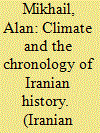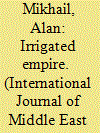| Srl | Item |
| 1 |
ID:
148810


|
|
|
|
|
| Summary/Abstract |
This article offers a chronology of climate events in Iran over the last millennium to challenge traditional chronologies of the Iranian past based on politics, war, and economics. Using insights gleaned from the historiography of climate in Iran, and from neighboring regions, especially the Ottoman Empire, four episodes of climate cooling show how climate-induced environmental processes affected more people for longer in Iran than did the policies of the empires ostensibly ruling over them. Thus, the article aims to put climate more squarely on the agenda of historians of Iran so that the conjectures advanced here can be confirmed, revised, or discarded through future empirical research. Moreover, the article seeks to bring Iran into wider conversations in environmental and global history.
|
|
|
|
|
|
|
|
|
|
|
|
|
|
|
|
| 2 |
ID:
101167


|
|
|
|
|
| Publication |
2010.
|
| Summary/Abstract |
Using both Ottoman Turkish and Arabic archival materials, this article narrates the history of irrigation in Fayyum during the first half of the 18th century. Its environmental perspective shows how a shared reliance on natural resource management bound together extremely rural regions of the Ottoman Empire like Fayyum with centers of power in Istanbul and Cairo. It seeks to make two historiographical interventions. First, its focus on irrigation reveals how the center-periphery model of early modern empires fails to capture the complexity of relationships that rural regions of the Ottoman Empire maintained with other provinces and towns both in the empire and beyond. Water in Fayyum grew food that forged connections of commodity movement with areas of the Mediterranean and Red Seas. Second, through an examination of such intraimperial and transregional ties, this article argues that Egyptian peasants held much of the power in these relationships.
|
|
|
|
|
|
|
|
|
|
|
|
|
|
|
|